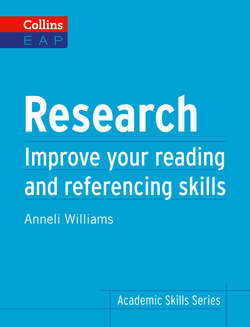Читать книгу Research: B2+ - Anneli Williams - Страница 43
Knowing who the experts are
ОглавлениеBefore you spend time reading a text, it is normally a good idea to check the author’s credentials. Authors of good quality, reliable information generally:
Glossary
credentials Someone’s credentials are their previous achievements, training, and general background, which indicate that they are qualified to do something.
have professional qualifications showing they have the knowledge and training to write about the topic
are connected to or work for a recognized and respected organization, for example a university, a research institute, a government department, or professional association
have their work published by recognized publishing houses, journals or organizations
are cited in other academic works
do not gain commercial advantage through promoting certain views.
Tips
If you are not sure whether a publisher, journal or organization is suitable, ask your lecturer and/or university librarian for advice.
If you do not know whether the author of a book or article has been cited in other academic works, check the bibliographies of related publications.
Search for the item through Google Scholar™, which shows how often publications have been cited in other academic literature.
Exercise 2
Read the following biographical information about an author.
Does the author appear to have suitable academic credentials? Why or why not?
‘Heidi Cullen is a senior research scientist with Climate Central, a non-profit research organization through which she reports on climate change for news outlets, including PBS NewsHour, Time.com and The Weather Channel. Before joining Climate Central, Dr. Cullen served as The Weather Channel’s first on-air climate expert and helped create Forecast Earth, the first weekly television series to focus on issues related to climate change and the environment. She is a visiting lecturer at Princeton University, a member of the American Geophysical Union and American Meteorological Society, and an associate editor of the journal Weather, Climate, and Society […] She holds a BS in engineering and a PhD in climatology from Columbia University and lives with her husband and two dogs in Princeton, New Jersey.’
Source: Extract “About the Author” from The Weather of the Future by Heidi Cullen. Copyright © 2010 by Heidi Cullen.
Tips
Use educational and government websites with internet suffixes: .edu, .ac or .gov as they are generally considered more credible.
Avoid online material that is published through commercial sites (sites with a .com or .co suffix) as they may be biased.
Websites of non-commercial organizations usually have a .org suffix. Cite widely known and respected organizations, such as the United Nations.
Be wary of other organizations set up to promote a particular view or cause. They may be biased so indicate this possibility in your essay if you cite them.
Exercise 3
A student searching the internet for texts for the essay: Is generosity an innate human trait? came up with the search results below. Which of the items should be treated with caution? Why?
| 1 Is altruism a genetic trait?: Scientific American | http://www.scientificamerican.com |
| 2 BBC NEWS | Science/Nature | Altruism ‘in-built’ in humans | http://news.bbc.co.uk |
| 3 Evolution of morality – Wikipedia, the free encyclopedia | http://en.wikipedia.org |
| 4 The natural selection of altruistic traits | http://courses.washington.edu |
| 5 Altruism essays | http://www.megaessays.com |
